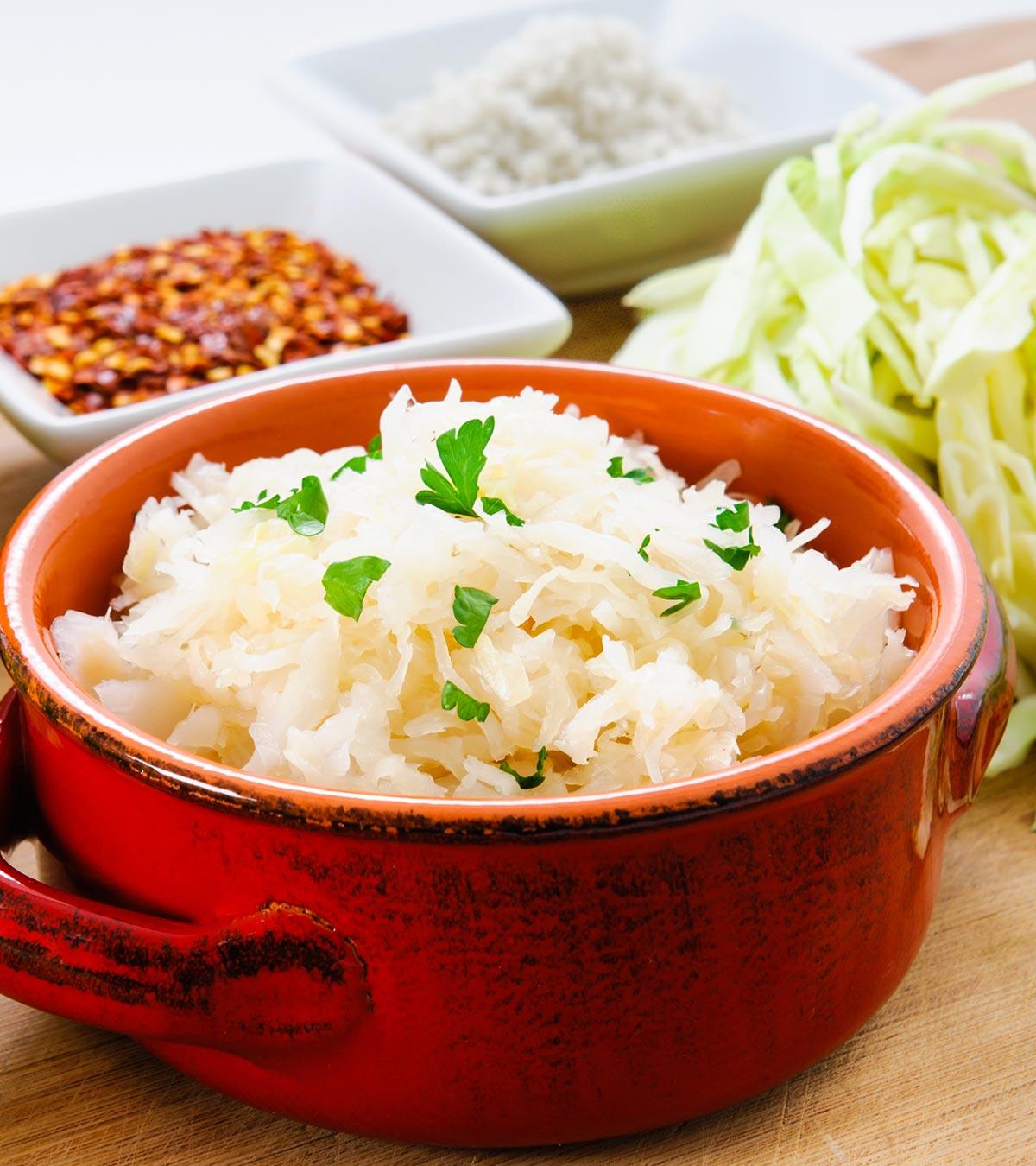Last Updated on January 15, 2025
Yes, sauerkraut can be safely consumed during pregnancy. It offers health benefits and supports digestion.
Sauerkraut is a type of fermented cabbage that is packed with nutrients and probiotics. During pregnancy, it is safe to eat sauerkraut as it undergoes a fermentation process that eliminates harmful bacteria. In fact, sauerkraut can offer numerous health benefits, including supporting digestion and boosting the immune system.
It is also a good source of vitamins C and K, as well as fiber. However, make sure to consume sauerkraut in moderation, as it can be high in sodium. As always, it is recommended to consult with your healthcare provider before making any significant changes to your diet during pregnancy.
Sauerkraut: A Healthy Choice For Pregnant Women
Pregnancy is a crucial time when both the mother and the developing baby require optimal nutrition for their growth and well-being. While there are certain foods that pregnant women need to avoid, sauerkraut, a traditional fermented cabbage dish, can be a healthy choice for expectant mothers. Packed with nutrients, sauerkraut offers a range of benefits that support the overall health of both mother and baby.
Rich in nutrients for both mother and baby
Sauerkraut is a nutrient-dense food that offers a variety of essential vitamins and minerals for the well-being of both the mother and the growing baby. It is a rich source of vitamin C, which is vital for immune system function and collagen formation. Additionally, sauerkraut provides vitamins K and B6, which are important for blood clotting and brain development respectively.
The fermentation process of sauerkraut enhances the bioavailability of these nutrients, making them easier for the body to absorb and utilize. This can be particularly beneficial during pregnancy when nutrient needs are higher than usual.
Provides probiotics for a healthy gut
Sauerkraut is a natural source of probiotics, which are beneficial bacteria that promote a healthy gut. During pregnancy, hormonal changes can affect gut health, leading to issues such as constipation and digestive discomfort. By incorporating sauerkraut into your diet, you can support a balanced gut microbiome and improve digestion.
Probiotics in sauerkraut help in maintaining a healthy intestinal environment, enhancing nutrient absorption, and reducing the risk of gastrointestinal infections. This can contribute to a smoother pregnancy experience and overall well-being.
Boosts immune system during pregnancy
A strong immune system is essential during pregnancy to safeguard the health of both the mother and the developing baby. Sauerkraut contains immune-boosting properties due to its high content of antioxidants and vitamin C. These nutrients help in neutralizing free radicals and supporting the body’s defense against infections and diseases.
By incorporating sauerkraut into your diet, you can enhance your immune system’s ability to fight off common illnesses, such as colds and flu, which can be more harmful during pregnancy. This can give you peace of mind and reduce the chances of complications during this precious time.
Sauerkraut is a nutritious and safe choice for pregnant women. Its rich nutrient profile, probiotic content, and immune-boosting properties make it a valuable addition to a well-rounded pregnancy diet. However, as with any food, moderation is key. Consult with your healthcare provider to ensure sauerkraut aligns with your specific dietary needs and medical conditions. Enjoy this tangy and flavorful dish as part of a balanced and varied diet to support a healthy pregnancy journey.
Potential Benefits And Risks Of Eating Sauerkraut
Sauerkraut, a popular fermented cabbage dish, offers several potential benefits and risks for pregnant individuals to consider. When consumed in moderation, sauerkraut can improve digestion, enhance nutrient absorption, and may even reduce the risk of gestational diabetes. However, it is important to be aware of the potential risks associated with this tangy treat, such as its high sodium content, the potential risk of listeria contamination, and the possibility of causing gas and bloating for some individuals.
Benefits:
Improves Digestion and Prevents Constipation
Sauerkraut is rich in probiotics, which are beneficial microorganisms that support a healthy gut. These probiotics aid in digestion by aiding in the breakdown of food and promoting the growth of beneficial gut bacteria. The fiber content in sauerkraut also helps prevent constipation, a common concern during pregnancy.
Enhances Nutrient Absorption
The fermentation process of sauerkraut not only increases its probiotic content but also enhances the availability of certain nutrients. The probiotics in sauerkraut help break down nutrients into more easily absorbable forms, allowing your body to make better use of the vitamins and minerals it provides, including vitamin C, vitamin K, and folate.
May Reduce the Risk of Gestational Diabetes
Recent studies have suggested that consuming probiotic-rich foods, such as sauerkraut, during pregnancy may help reduce the risk of gestational diabetes. Gestational diabetes is a condition that occurs during pregnancy and can increase the risk of complications for both the mother and the baby. While more research is needed to fully understand the link between sauerkraut and gestational diabetes, incorporating this fermented food into your diet may offer potential benefits.
Risks:
High Sodium Content
Although sauerkraut offers various health benefits, it is important to note that it is typically high in sodium. Excessive sodium consumption during pregnancy can lead to fluid retention and increased blood pressure, posing potential risks for both the mother and the baby. Therefore, it is important to consume sauerkraut in moderation and consider other low-sodium options if you have hypertension or other health conditions that require a low-sodium diet.
Potential Risk of Listeria Contamination
Due to its fermented nature, sauerkraut has a low pH, which inhibits the growth of harmful bacteria. However, there is still a small risk of listeria contamination, a foodborne illness that can cause serious complications during pregnancy. To reduce this risk, it is crucial to ensure that the sauerkraut you consume is properly fermented, stored, and purchased from a reputable source.
Gas and Bloating for Some Individuals
Sauerkraut can be a source of gas and bloating for certain individuals. The fermentation process can produce gases that may lead to discomfort, especially for those who already have sensitive digestive systems. If you experience gas and bloating after consuming sauerkraut, it may be best to reduce your intake or opt for other probiotic-rich foods that are better tolerated.
Safe Practices For Consuming Sauerkraut During Pregnancy
During pregnancy, it’s important to be mindful of the foods we consume to ensure the health and well-being of both mom and baby. Sauerkraut, a fermented cabbage dish, can be a nutritious addition to a pregnant woman’s diet. However, there are safety precautions to take when it comes to choosing, handling, and consuming sauerkraut. In this section, we will explore some safe practices to follow when enjoying sauerkraut during pregnancy.
Choose Pasteurized Sauerkraut Products
When selecting sauerkraut during pregnancy, it is crucial to opt for pasteurized sauerkraut products. Pasteurization is a process that involves heating the sauerkraut to kill harmful bacteria. By choosing pasteurized sauerkraut, you can ensure that any potential pathogens have been eliminated, reducing the risk of foodborne illnesses. Check the label or inquire with the manufacturer to confirm that the sauerkraut you are purchasing has undergone the pasteurization process.
Watch Sodium Intake and Opt for Low-Sodium Options
Pregnant women are advised to manage their sodium intake, as excessive consumption of salt can lead to high blood pressure and fluid retention. When consuming sauerkraut, it is essential to be mindful of its sodium content. Opt for low-sodium sauerkraut options to keep your sodium levels in check. These products typically contain less salt, allowing you to enjoy the tangy goodness of sauerkraut without exceeding your sodium limits.
Store and Handle Sauerkraut Properly to Avoid Contamination
Proper storage and handling of sauerkraut are crucial in preventing contamination and foodborne illnesses. Here are some tips to ensure the safety of your sauerkraut:
- Store sauerkraut in a refrigerator at a temperature below 40°F (4°C) to inhibit the growth of bacteria.
- Keep sauerkraut away from raw meats, poultry, and seafood to prevent cross-contamination.
- Seal the sauerkraut container tightly to maintain its freshness and prevent the entry of contaminants.
Start with Small Portions and Monitor Any Adverse Reactions
When introducing sauerkraut into your pregnancy diet, it is advisable to start with small portions. This allows you to gauge your body’s response and monitor for any adverse reactions. While sauerkraut is generally safe for consumption during pregnancy, individual sensitivities and allergies can vary. Pay attention to any signs of discomfort, such as digestive issues or allergic reactions. If you experience any adverse reactions, it is best to discontinue consuming sauerkraut and consult with your healthcare provider.
By following these safe practices, you can incorporate sauerkraut into your pregnancy diet with peace of mind. Always remember to prioritize food safety and listen to your body’s signals throughout your pregnancy journey.

Credit: www.momjunction.com
Frequently Asked Questions Of Can You Eat Sauerkraut During Pregnancy?
Can Sauerkraut Be Consumed During Pregnancy?
Yes, sauerkraut can be safely consumed during pregnancy as it is a great source of probiotics and vitamin C.
Is Sauerkraut Beneficial For Pregnant Women?
Absolutely! Sauerkraut is rich in fiber, vitamins, and minerals, making it a healthy addition to a pregnant woman’s diet.
Are There Any Risks Associated With Eating Sauerkraut While Pregnant?
No, sauerkraut is generally considered safe during pregnancy. However, always check with your healthcare provider for any individual concerns.
Can Sauerkraut Help With Digestion During Pregnancy?
Yes, sauerkraut promotes a healthy gut environment by aiding digestion, reducing bloating, and preventing constipation.
How Much Sauerkraut Can Be Consumed During Pregnancy?
Moderation is key. As part of a balanced diet, enjoying a serving of sauerkraut a few times a week is perfectly fine during pregnancy.
Conclusion
To wrap up, sauerkraut can be a beneficial addition to a pregnant woman’s diet due to its many nutritional advantages. It is high in fiber, vitamins, and probiotics that promote digestive health and strengthen the immune system. By consuming sauerkraut in moderation and ensuring it is properly fermented, women can enjoy its unique tangy flavor and reap its various health benefits during pregnancy.







